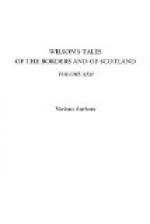“After the birth of my child, came the baptism. I had no conscientious objection to the tenets of the Established Church of my country; but I belonged to no religious community. I had never thought of it as an obligation beyond that of custom, and deferred it from year to year, till I felt ashamed to ‘go forward’ on account of my age. My wife was a Cameronian; and to them, though I knew nothing of their principles, I had an aversion. But for her to hold up the child while I was in the place, was worse than heathenism—was unheard-of in the parish. The nearest Episcopal chapel was at Kelso, a distance of ten miles. The child still remained unbaptized. ‘It hasna a name yet,’ said the ignorant meddlers, who had no higher idea of the ordinance. It was a source of much uneasiness to my wife, and gave rise to some family quarrelling. Months succeeded weeks, and eventually the child was carried to the Episcopal church. This choked up all the slander of the town, and directed it into one channel upon my devoted head. Some said I ‘wasna sound,’ and all agreed I ‘was nae better than I should be,’ while the zealous clergyman came to my father, expressing his fears that ’his son was in a bad way.’ For this, too, am I indebted to procrastination. I thus became a martyr to supposed opinions, of which I was ignorant; and such was the unchristian bigotry of my neighbours, that, deeming it sinful to employ one whom they considered little other than a pagan, about five years after my marriage I was compelled to remove with my family to London.
“We were at this period what tradesmen term miserably hard up. Having sold off our little stock of furniture, after discharging a few debts which were unavoidably contracted, a balance of rather less than two pounds remained; and upon this, my wife, my child, and myself were to travel a distance of three hundred and fifty miles. I will not go over the journey: we performed it on foot in twenty days; and, including lodging, our daily expense amounted to one shilling and eightpence; so that, on entering the metropolis, all we possessed was five shillings and a few pence. It was the dead of winter, and nearly dark, when we were passing down St. John Street, Clerkenwell. I was benumbed, my wife was fainting, and our poor child was blue and speechless. We entered a public-house near Smithfield, where two pints of warm porter and ginger, with a crust of bread and cheese, operated as partial restoratives. The noisy scene of butchers, drovers, and coal-heavers was new to me. My child was afraid, my wife uncomfortable, and I, a gaping observer, forgetful of my own situation. My boy pulled my coat, and said, ’Come, father;’ my wife jogged my elbow, and reminded me of a lodging; but my old reply, ‘Stop a little,’ was my ninety and nine times repeated answer. Frequently the landlord made a long neck over the table, gauging the contents of our tardily emptied pint; and, as the watchman was calling ‘Past eleven,’ finally took it away, and bade us ‘bundle off.’ Now I arose, feeling at once the pride of my spirit and the poorness of my purse, vowing never to darken his door again, should I remain in London a hundred years.




